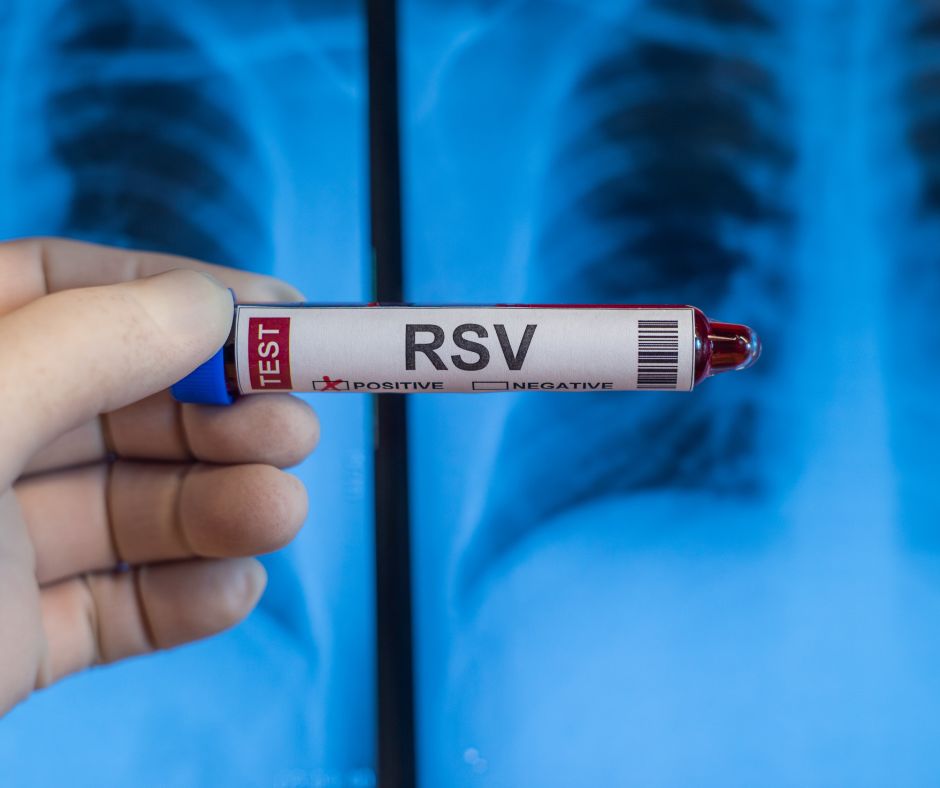Most people associate RSV (Respiratory Syncytial Virus) with babies and small children, and for good reason: this respiratory virus is so common in young patients that almost all children will have had an RSV infection by their second birthday.
But don’t think you’re safe when you grow past school-age. RSV can infect adults as well, and although most cases are mild and short-lived it can lead to serious illness in certain high-risk patients. According to the National Foundation for Infectious Disease, RSV is estimated to cause 60,000-160,000 hospitalizations and up to 10,000 deaths in older adults in the U.S. each year.
But what exactly is RSV, and what role does it play in adult respiratory health?
What is RSV?
RSV, or Respiratory Syncytial Virus, is a highly contagious respiratory virus that infects the nose, throat, breathing passages and lungs. Peak outbreak season – when most RSV cases occur – has an unusually long run from early fall to late spring. During this time, It spreads easily through a variety of ways: you can have direct contact with the virus, such as by kissing an infected child; touching a contaminated surface (like a door knob or table) and then touching your face before washing your hands; or inhaling the virus through airborne droplets when an infected person coughs or sneezes in your personal space.
Children are commonly infected in schools or daycare centers and then transmit the virus to other (and older) members of the family. In the United States, RSV is now recognized as the most common cause of lower respiratory tract infections in older adults. And unlike other illnesses, a natural RSV infection can only provide partial immunity at best; that means you can get the infection more than once–even multiple times in the same season.
Symptoms of RSV in Adults
RSV usually causes mild cold-like symptoms that resemble many other respiratory viruses. In fact, you’ve probably had RSV at least once during your lifetime and brushed it off as that common sinus crud. In otherwise healthy adults, RSV symptoms usually present within 4 to 6 days of exposure and may include:
- Runny nose
- Dry cough
- Sneezing
- Sore throat
- Low-Grade fever
- Headache
- Loss of appetite
Some infected adults have few to no noticeable symptoms, and most will recover at home within one to two weeks.
Severe RSV Symptoms
Certain patients are at higher risk of experiencing serious illness from an RSV infection, especially if it’s your first time with the virus. Signs of a severe RSV infection include a severe cough, audible wheezing, difficulty breathing, and a bluish tint to the skin due to lack of oxygen.
In some cases, RSV can spread to the lower respiratory tract and lead to more serious conditions such as bronchiolitis or pneumonia. It can also exacerbate chronic lung conditions like COPD and asthma. It’s important to seek medical attention if you have serious symptoms or an underlying lung condition.
RSV Risk Factors
RSV can affect any person at any age, but some patients are at high risk for serious and recurring infections. Those with the highest RSV risk include:
- Adults over 65 years of age
- Adults with a chronic lung or heart disease
- Adults with a weakened or compromised immune system
- Infants and small children (under two years old)
The FDA recently approved RSV vaccinations for these and other high-risk patients. Talk to your healthcare provider about whether getting an RSV vaccine is right for you. And of course, good hygiene habits go a long way in preventing an RSV problem, so be sure to wash your hands often, avoid touching your face, keep toys and surfaces clean and stay home if you’re sick!
Treating RSV in Adults
As a viral illness, there is no go-to cure for an RSV infection. The primary treatment for mild cases includes rest, fluids, and OTC medications for fever and pain. More severe cases may require oxygen therapy, respiratory care treatments, or hospitalization.
If you have COPD or asthma, be sure to maintain use of all prescribed medications to reduce trouble breathing and keep your condition under control. If you sign up for our respiratory supply program, you can have respiratory medications and supplies delivered right to your door each month! Visit us online to learn more.

